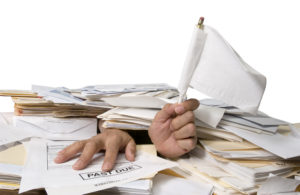“How long should I keep paperwork around for?” I get this question a lot, but it’s not a quick answer. Hopefully this will help to help clarify it.

Man buried in paperwork and bills. All you see of him are his hands waving a surrender flag. White background with clipping path.
Regarding income tax returns:
- The IRS has 3 years from the time you file to audit a return or the due date, whichever is later, so absolutely keep all the backup materials to your tax return for at least three years, four including the tax return currently being prepared.
- They get 7 years to audit a return if they allege substantial underpayment of taxes, which basically means that anyone who isn’t simply a wage earner should probably keep stuff for seven full years before they shred the backup.
- If you never filed a return the statute of limitations never starts.
In practice, I recommend that you keep receipts and final paystubs and cancelled checks that backup the information on your tax return for three to seven years, and then most things can be shredded. But keep the actual tax return forever.
Other things to hold on to are:
- Documentation about IRA contributions you made: the annual form 5498 that the IRA custodian sends you is all you need, especially if you’ve kept a copy of your tax returns showing how much you deducted each year.
- Records of stock purchases: it becomes the “basis” for calculating capital gains. Keep this until you sell the stock, then move it into the tax return backup folder.
- Keep savings bonds until you cash them in. Unlike most financial instruments, they’re often just GONE if you lose the piece of paper. A good tip is to write down all their serial numbers and dates of issue in something like Savings Bond Calculator.
- At least one statement from each account you have someplace. These days people have online banking and paperless statements and it can be hard to figure out where your accounts are if there isn’t some paperwork trail.
- Settlement statements from the closing of the house. Actually, keep the entire closing packet. It may have information about title insurance in it, too.
- Receipts and records about home improvements you made (over and above daily maintenance.) It’s unlikely we’ll use it, but we might. Once you sell the house we can shred it if we didn’t use it. If we did use it then it goes in with that year’s tax backup materials.
- Hold onto the check stub that comes with lottery winnings. Often the W-2G comes with the check and you’ll need it at tax time.
- Hold onto your most recent paystub until you get the last paystub of the year. Tuck that in your tax folder as backup for your tax return. (We sometimes need it to get a W-2 corrected.)
It’s a good practice to have:
- Estate planning documents, including your will, health care proxy, and durable power of attorney for finances. If you make a new one you should write “REVOKED” on the old one.
- End-of-life planning documents like your living will (or Five Wishes or MOLST), and HIPAA releases.
- Insurance documents for policies in force, including home, car, disability, life, umbrella, malpractice and long-term care insurance, if you have it.
- Keep release of liens on car loans and mortgages until you sell the car or house, just in case the lien wasn’t lifted properly.
- Keep titles on cars you own.
- Keep a copy of all leases and other contracts until the contract ends. You’d be surprised how often you go back to look at these things.
- A list of logins/passwords in a safe place that a trusted family members knows.
I hope this helps!
Updated 10-10-2022
